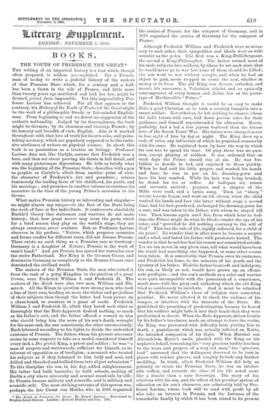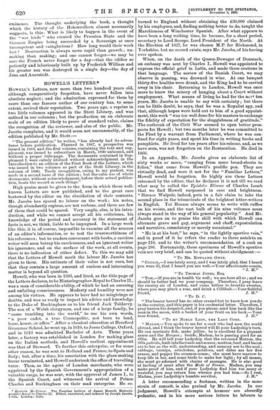BOOKS.
THE YOUTH OF FREDERICK THE GREAT.* THE writing of an impartial history is a feat which, though often proposed, is seldom accomplished. For a French- man of to-day to write a judicial history of the makers of that Prussian State which, for a century and a half, has been a thorn in the side of France, and little more than twenty years ago mutilated and laid her low, might be deemed, primal facie, impossible. Yet this impossibility Pro- fessor Lavisse has achieved. For all that appears to the contrary, his History of the Youth of Frederick the Great might be the work of a philosophic Swede or fair-minded English- man. From beginning to end we detect no suggestion of the author's nationality. Judged by its thoroughness, the book might be German ; by its clearness and vivacity, French ; by its honesty and breadth of view, English. Also is it marked throughout with that love of truth for its own sake, and pains- taking accuracy, which are popularly supposed to be the exclu- sive attributes of writers on physical science. In short, this book is as passionless as a treatise on biology. Professor Lavisse does not, like Carlyle, assume that Frederick was a hero, and then set about proving his thesis in full detail, and with many picturesque digressions. He tells us briefly what was the beginning of the Prussian State; describes with a pen as graphic as Carlyle's, albeit from another point of view, the character of Frederick's sire and grandsire ; relates luminously the leading facts of his childhood, his youth, and his marriage ; and promises in another volume to continue his narrative to the time of the young Prince's accession to the throne.
What makes Prussian history so interesting and singular— we might almost say unique—is the fact of the State being the work of four or five individuals. It controverts absolutely Buckle's theory that statesmen and warriors do not make history ; that, how great soever may seem the parts which for a brief season they play on the world's stage, they are always creatures, never creators. But, as Professor Lavisse observes in his preface, "Nature, which prepares countries and forms cradles for different races, did not foresee Prussia. There exists no such thing as a Prussian race or territory : Germany is a daughter of Nature ; Prussia is the work of man's hand." And yet Prussia has spread her tentacles over the entire Fatherland. Her King is the German Caesar, and dominates Germany as completely as the Roman Caesars once dominated the civilised world.
The makers of the Prussian State, the men who raised it from the rank of a petty Kingdom to the position of a great Power, were Frederick William I. and Frederick II. The makers of the Reich were also two men, William and Bis- marck. All the Kings in question were strong men, who took a line of their own, heeding no more the wishes and prejudices of their subjects than though the latter had been pawns on a chess-board, or counters in a game of cards. Frederick William L and Frederick II., albeit they hated each other so thoroughly that the Heir-Apparent desired nothing so much as his father's exit, and the father offered a reward to him who should bring him the news of his son's death, wrought for the same end, the one consciously, the other unconsciously. Each laboured according to his lights to decide the undecided existence of Prussia. The father, whom his present successor seems in some respects to take as a model, considered himself every inch a Dei gratili King, a priest and soldier ; he was " a man of prayers and watchwords, sufficient for himself, as in- tolerant of opposition as of irreligion; a monarch who treated his subjects as if they belonged to him body and soul, and drilled and thrashed and bullied them into abject submission."
To this discipline the son, in his day, added enlightenment.
His father had built barracks; he built schools, making of Berlin a city where university and arsenal stand side by side.
So Prussia became military and scientific, and is military and scientific still. The most striking outcome of this system was, perhaps, the late Count von Moltke, who in 1866 organised
• The Youth of Frederick the Great. By Ernest Lavine. Translated by Stephen Louis Simeon. London : Richard Bentley and Eon. 1891.
the armies of Prussia for the conquest of Germany, and in 1870 organised the armies of Germany for the conquest of France.
Although Frederick William and Frederick were so neces- sary to each other, their sympathies and ideals were as wide asunder as the poles. The first was a King-Drill-Sergeant, the second a King-Philosopher. The father turned most of his male subjects into soldiers, by whom he set such store that he would never go to war lest some of them should be killed ; the son went to war without scruple, and, when he had an object to gain, never stopped to count the cost, whether in money or in lives. The old King was devout, orthodox, and moral; his successor, a Voltairian atheist, and as cynically contemptuous of every human and divine law as the proto- type of Machiavelli's " Prince."
Frederick William thought it would be as easy to make Fritz a good Christian as to turn a country bumpkin into a smart soldier. Nevertheless, he left nothing to chance ; chose the lad's tutors with care, laid down precise rules for their guidance, and himself superintended his education. Never, probably, had a lad a less joyous boyhood than the future hero of the Seven Years' War. His tutors were charged never to lose sight of him by day or night. The King drew up a code of rules, any infraction of which he punished summarily with his cane. He regulated hour by hour the way in which his son was to spend his time. Of play there was no ques- tion, except playing at soldiers. It was ordained that on week days the Prince should rise at six. He was for- bidden to dawdle in bed, and enjoined to dress quickly. When he had said his little prayer, and washed his hands and face, he was to put on his dressing-gown and have his hair combed. While his hair was being brushed, he drank his tea or coffee. At half-past six, tutors and servants arrived ; prayers, and a chapter of the Bible were read, and a hymn sung. Then (at " sharp" seven) lessons began, and went on till eleven, when the child washed his hands and face (the latter without soap) a second time, had his hair powdered, exchanged his dressing-gown for a coat., and was taken to his father, with whom he stayed till two. Then lessons again until five, from which hour to bed- time the Prince might do what he liked,—under the eye of his tutor, and " provided he did nothing contrary to the will of God." This was the rule of life, rigidly enforced, for a child of six years ! No wonder that in after-years he became a sceptic and a rebel, and hated his father with passionate hatred. The wonder is that he neither lost his reason nor committed suicide. Yet we can never, in any given case, tell what would have been the result had something else'happened, or some other course been taken. It is conceivable that Prussia owes its eminence, and Frederick his fame, to the miseries of his youth and the tyranny of his father. Had the father been soft and indulgent, the son, as likely as not, would have grown up an effemi- nate profligate ; and the son's methods as a ruler and warrior were quite incompatible with the possession of a conscience, much more with the piety and orthodoxy which the old King tried so assiduously to inculcate. And it must be admitted that Frederick William's ideas of religion were somewhat peculiar. He never allowed it to check the violence of his temper, or interfere with the interests of the State. He prohibited the preaching of predestination, because he feared that his soldiers might take it into their heads that they were predestined to desert. When the Heir-Apparent, driven frantic by his father's harshness, made an attempt to leave the realm, the King was prevented with difficulty from putting him to death, a punishment which was actually inflicted on Katte, the intended companion of his flight. When Marshal von Alvensleben, Katte's uncle, pleaded with the King on his nephew's behalf, beseeching his "very gracious lord to hearken to the tears and prayers of a very old man," the "gracious lord " answered that the delinquent deserved to be torn in pieces with red-hot pincers, and roughly forbade any further meddling. In truth, albeit Frederick William did help so potently to create the Prussian State, he was an intoler- able ruffian, and towards the close of his life acted more like a lunatic than a sane Sovereign. The story of his relations with his son, and the effect of his peculiar system of education on his son's character, are admirably told by Pro- fessor Lavisse, whose book will be read with profit by all who take an interest in Prussia, and the fortunes of the remarkable family by which it has been raised to its present
eminence. The thought underlying the book, a thought which the history of the Hohenzollern almost necessarily suggests, is this : What is likely to happen in the event of the " war lords " who created the Prussian State and the German Empiro being succeeded by a Sovereign at once incompetent and vainglorious ? How long would their work last ? Destruction is always more rapid than growth ; un- making than making ; and one cannot forget—we may be sure the French never forget for a day—that the edifice so patiently and laboriously built up by Frederick William and his greater son was destroyed in a single day—the day of Jena and Auerstadt.























































 Previous page
Previous page